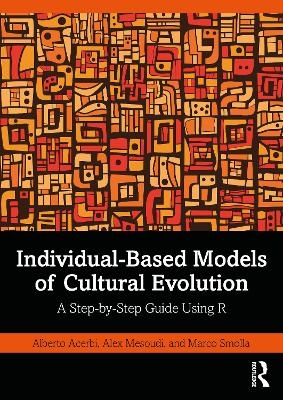
Individual-Based Models of Cultural Evolution
Routledge (Verlag)
978-1-032-25206-3 (ISBN)
Individual-Based Models of Cultural Evolution shows readers how to create individual-based models of cultural evolution using the programming language R. The field of cultural evolution has emerged in the last few decades as a thriving, interdisciplinary effort to understand cultural change and cultural diversity within an evolutionary framework and using evolutionary tools, concepts, and methods.
Given its roots in evolutionary biology, much of cultural evolution is grounded in, or inspired by, formal models. Yet many researchers interested in cultural evolution come from backgrounds that lack training in formal modelling, such as psychology, anthropology or archaeology. This book addresses that gap. It provides example code in R for readers to run their own models, moving from very simple models of the basic processes of cultural evolution, such as biased transmission and cultural mutation, to more advanced topics such as the evolution of social learning, demographic effects, and social network analysis.
Features of this book:
Recreates existing models in the literature to show how these were created and to enable readers to have a better understanding of their significance and how to apply them to their own research questions
Provides full R code to realize models and analyse and plot outputs, with line-by-line analysis
Requires no previous knowledge of the field of cultural evolution, and only very basic programming knowledge
This is an essential resource for researchers and students interested in cultural evolution, including disciplines such as psychology, anthropology, archaeology, and biology as well as sociology and digital humanities.
Alberto Acerbi is Lecturer in the Centre for Culture and Evolution, Brunel University London, UK. He is interested in contemporary cultural phenomena, using a naturalistic, quantitative, and evolutionary approach with different methodologies, especially individual-based models and quantitative analysis of large-scale cultural data. Alex Mesoudi is Professor of Cultural Evolution at the University of Exeter’s Cornwall Campus, UK. He conducts lab experiments, constructs theoretical models and analyses real-world data to try to understand how human culture evolves over time and shapes human behaviour. Marco Smolla is Postdoctoral researcher at the Max-Planck Institute for Evolutionary Anthropology, Germany. He is a computational and evolutionary biologist, with a special interest in how humans shape and are shaped by culture. Using simulation models and dynamic social networks, he studies which conditions lead to the emergence and adoption of new and existing culture.
Introduction Section I. Basics 1. Unbiased Transmission 2. Unbiased and Biased Mutation 3. Biased Transmission: Direct Bias 4. Biased Transmission: Frequency-dependent Indirect Bias 5. Biased Transmission: Demonstrator-based Indirect Bias 6. Vertical and Horizontal Transmission 7. Multiple Traits Models; Section II. Advanced Topics: The Evolution of Cultural Evolution 8. Rogers’ Paradox 9. Rogers’ Paradox: A Solution; Section III. Advanced Topics: Cultural Inheritance 10. Reproduction and Transformation 11. Social learning of Social Learning Rules 12. Traits Inter-dependence; Section IV. Advanced Topics: Culture and Populations 13. Demography 14. Social Network Structure 15. Group Structured Populations and Migration References Index
| Erscheinungsdatum | 16.06.2022 |
|---|---|
| Zusatzinfo | 97 Halftones, color; 97 Illustrations, color |
| Verlagsort | London |
| Sprache | englisch |
| Maße | 174 x 246 mm |
| Gewicht | 3020 g |
| Themenwelt | Geisteswissenschaften ► Psychologie ► Allgemeine Psychologie |
| Geisteswissenschaften ► Psychologie ► Test in der Psychologie | |
| Sozialwissenschaften ► Ethnologie | |
| Sozialwissenschaften ► Soziologie | |
| ISBN-10 | 1-032-25206-5 / 1032252065 |
| ISBN-13 | 978-1-032-25206-3 / 9781032252063 |
| Zustand | Neuware |
| Informationen gemäß Produktsicherheitsverordnung (GPSR) | |
| Haben Sie eine Frage zum Produkt? |
aus dem Bereich


